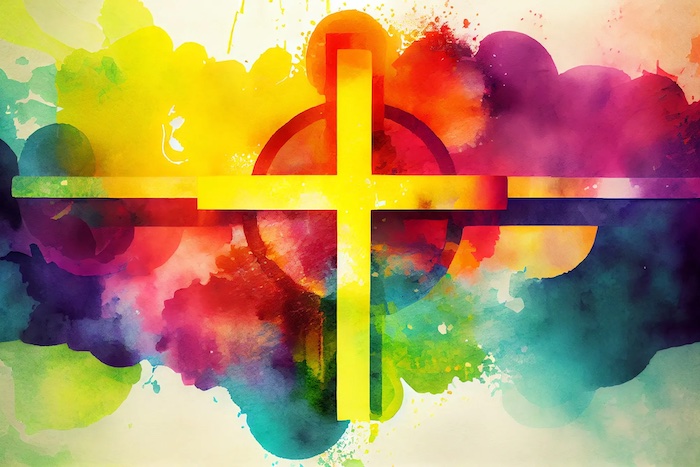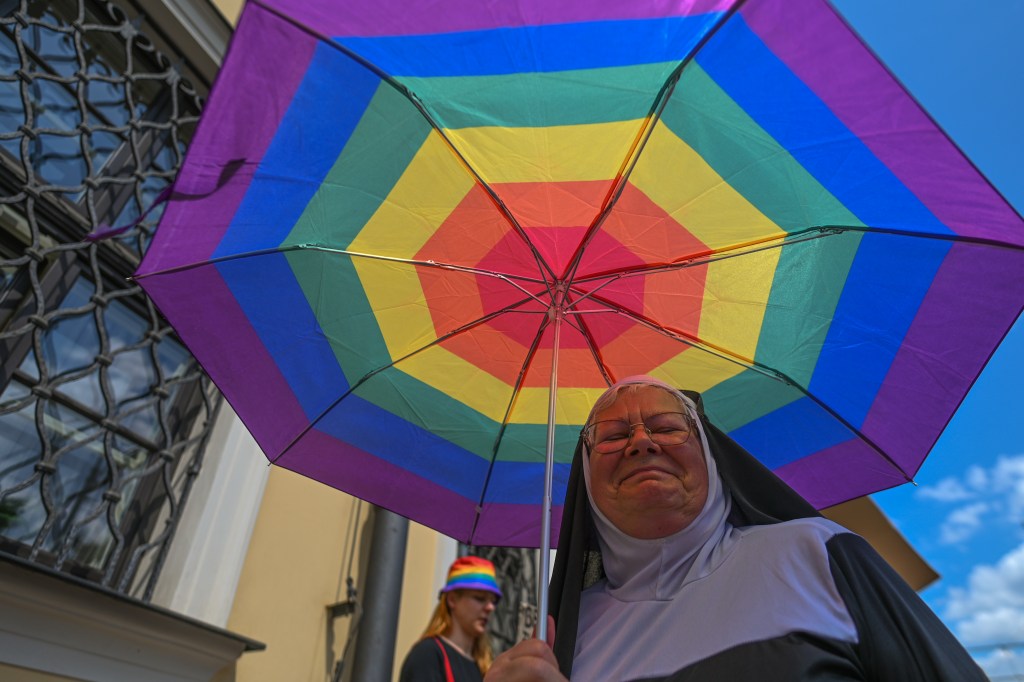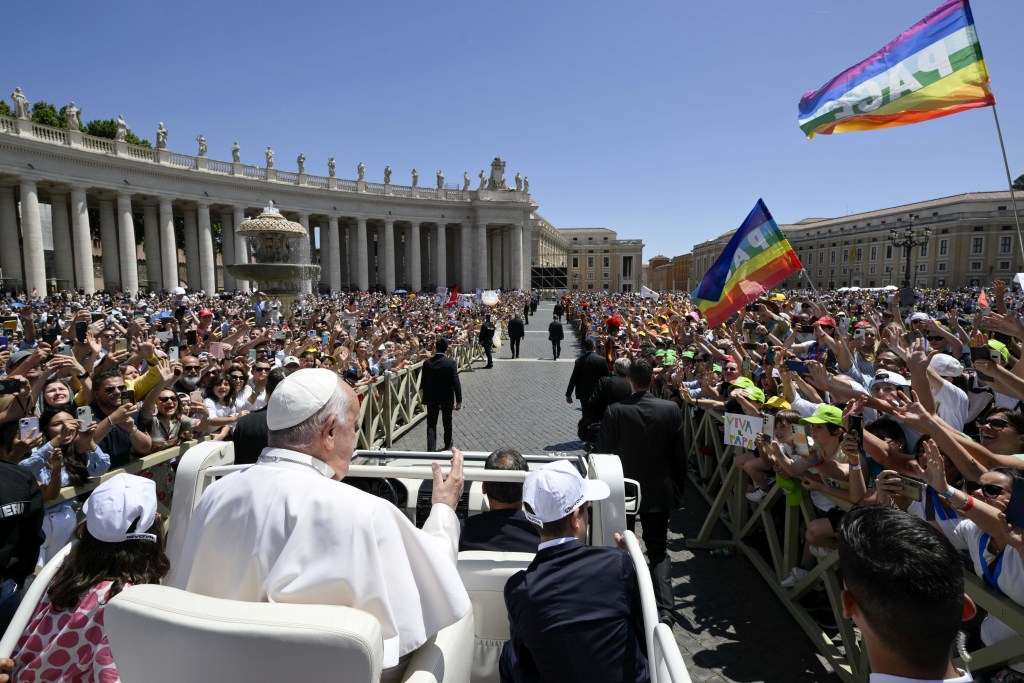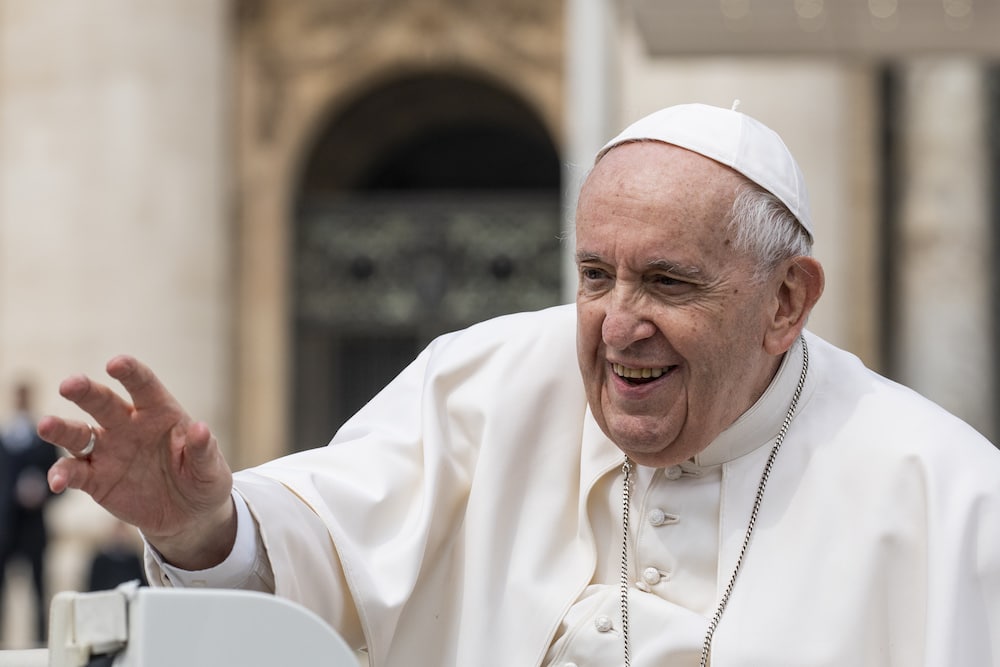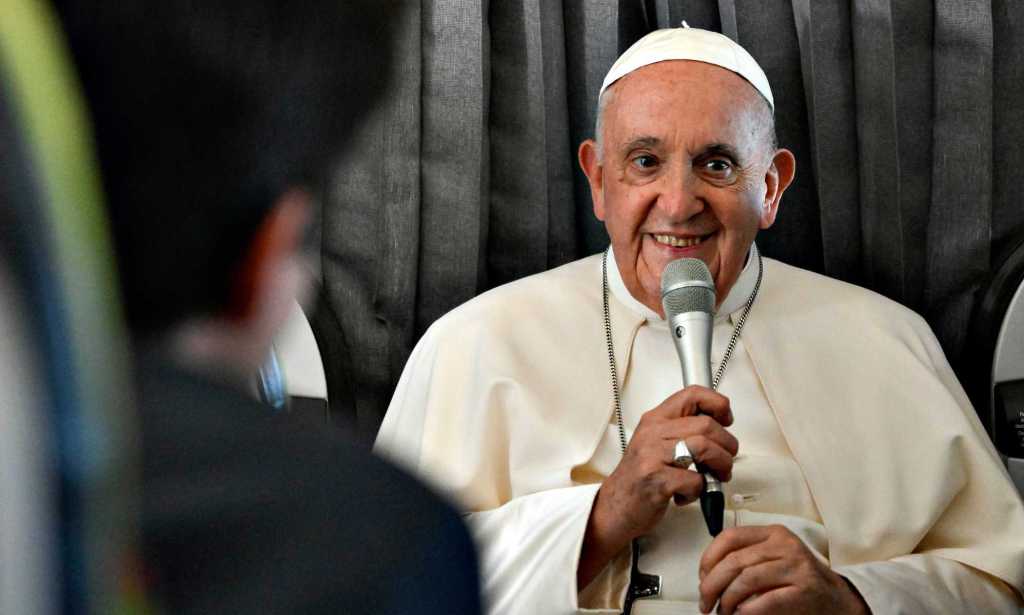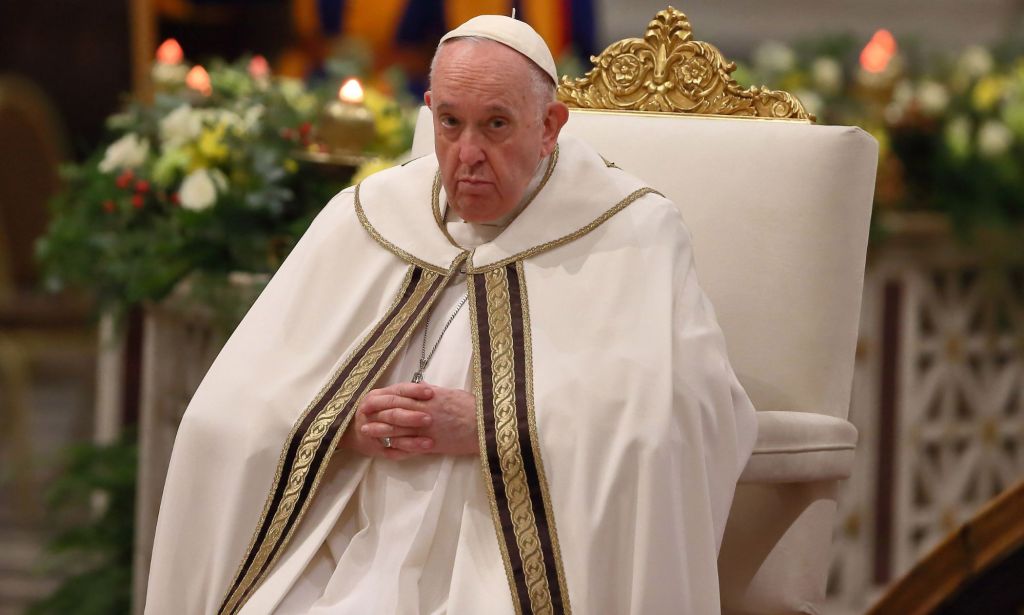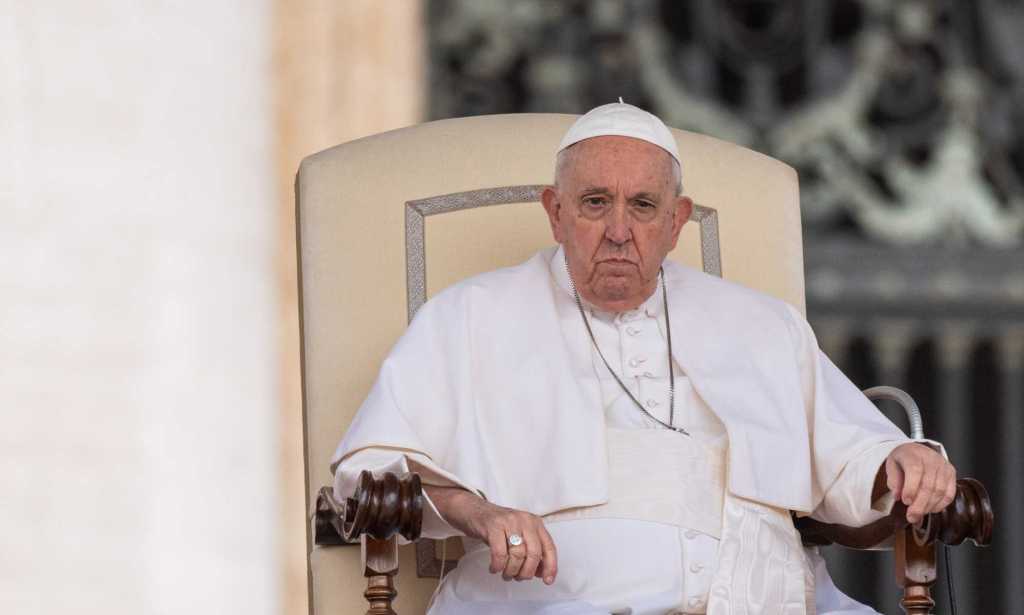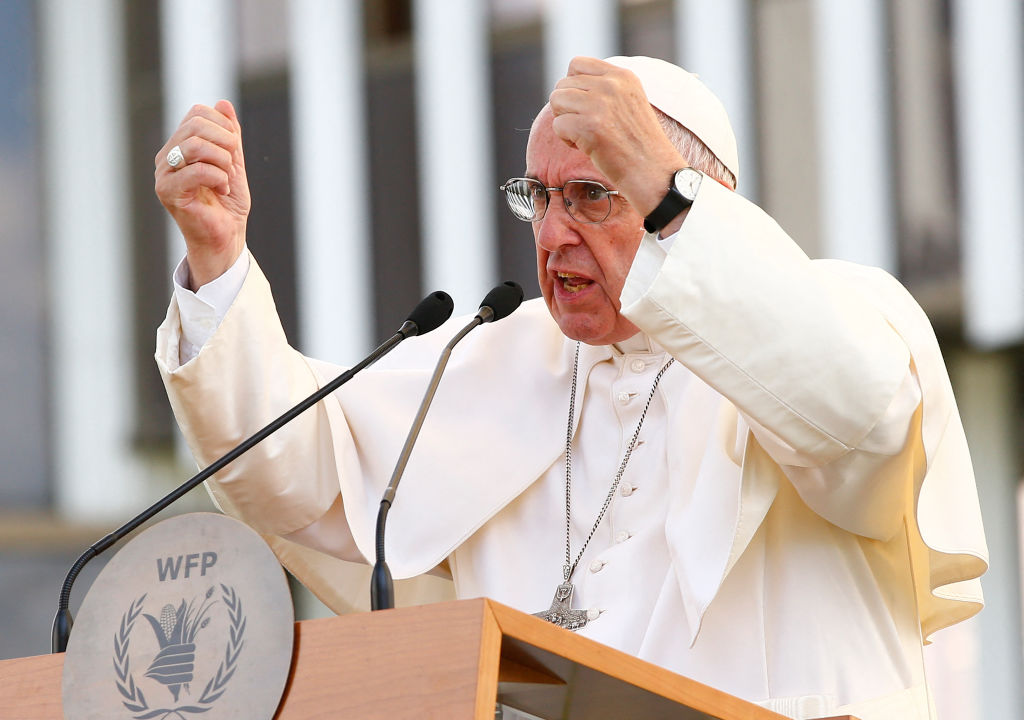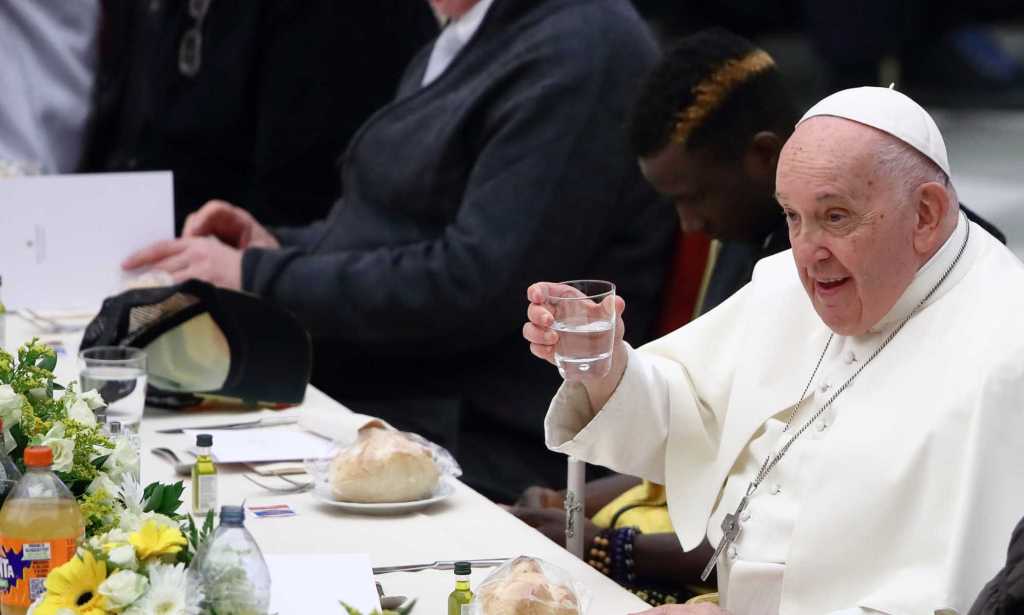— Trouble is brewing in the very regions that cradled the 16th-century Protestant Reformation.

By BEN MUNSTER
The events that sent the Catholic Church to the brink of a full-blown schism really got going just after lunch.
On a freezing afternoon last November in central Berlin, a few hundred German Catholic politicians, theologians and captains of industry piled into the grand chandeliered assembly hall of the Hotel Titanic Chaussee to put the final touches on an ambitious reform that would allow them to effectively overrule their own bishops — and by extension the Holy See.
During a rowdy assembly lasting several hours, with the wind whipping outside, the delegates complained that Pope Francis had let the German Church down on key issues such as clerical sex abuse, gay marriage and trans rights, on which the German faithful desperately sought progress.
“They found out, using human science, that there are more than two genders — and yet the pope rejects this!” the theologian Andreas Lob-Hüdepohl fumed from beneath a mushroom cloud of fuzzy red hair. “Nobody knows where he goes, he’s always changing his mind. There’s no throughline in his doings, no logic.’”
Since the beginning of his papacy, Francis has faced attacks from conservatives worried he’s gone too far on issues like homosexuality, abortion and capitalism. But those gathered in Berlin were complaining of precisely the opposite: that he isn’t liberal enough.
“Francis was elected to renew the Catholic Church,” said Thomas Söding, the vice president of the Central Committee for German Catholics, the group that descended on the German capital in November. But the pope’s failure to bring about any meaningful change has left the Church archaic and unfixed, he said, forcing the Germans to try and beat their own path.
It would be wrong to say Francis has done nothing to earn his reputation as a liberal revolutionary. Since the start of his papacy, the pontiff has roiled the religious hierarchy with interventions in popular debates, not only on sexuality but also on the economy, immigration and climate change. He has introduced some genuine reforms, including opening high-level offices in the Holy See to women, and has famously embraced a tolerant, each-to-his-own philosophy, even declaring that heaven is open to atheists. Asked about gay priests during an exchange with reporters on the papal plane returning from his first foreign trip, the pontiff answered: “Who am I to judge?”
This has all been accompanied by a conspicuous effort to project holiness and humility. Francis decided early to settle into the Vatican’s cramped Santa Marta guesthouse instead of the opulent abode of previous popes, and he ditched the bulletproof popemobile for a navy Ford Focus. Just days after the conclusion of the conclave that elected him, the then-Archbishop Jorge Bergoglio of Buenos Aires was reported to have expected so little of his chances that he’d already booked a return ticket to Argentina.
But even as conservatives in the United States, Africa and the Vatican itself have fumed over Francis’s self-consciously populist approach, repeated right-wing attacks on his authority have fizzled. Instead, the more serious challenge has come from those who complain the pope’s liberal reforms have been half-hearted, stopping short of theological change while being overshadowed by scandal.
Last year, for example, a landmark declaration allowing clerical blessings for same-sex couples was diluted after a fiasco involving religious musings on the nature of orgasms. In late May, moreover, Francis’s own liberal bona fides were questioned after multiple reports that he had used a homophobic slur behind closed doors.
Driven to desperation, progressive Catholics in Germany and elsewhere have seized on an effort by Francis to inject a modicum of consultative democracy into the Church — an arcane initiative he has dubbed “synodality.” Since then they have used the process to seize powers normally reserved for the ordained and to steer their local branches in a direction more to their liking. Many, indeed, want to harness the synodal process to actually change Church law.
“Ninety percent of people who leave the Church say they are angry with sexual abuse, clerical corruption, that they are angry with the leadership,” Söding said. “There is this idea of holy men who are elected by God himself and have the position to lead the Church — even if the big majority of the faithful are not convinced that this is the right way.”

For much of the past year, the German challenge has rippled through the Catholic Church, prompting dire warnings of a schism and calls for a conservative crackdown. It hasn’t gone unnoticed that the threat to clerical authority has erupted in the very regions that cradled the 16th-century Lutheran upheavals. Last year, one prominent archbishop described the events in the German Church as “the greatest crisis since the Reformation.” And though the uprising has recently been subdued, it shows no signs of ending.
* * *
Some revolutions are full of fire, rage and righteous oratory. The progressive revolt against Francis, however, has a more German hue, one of careful and piecemeal administrative reform.
The Teutonic rumblings began in 2018 with a landmark inquiry into Germany’s clerical abuse crisis. Commissioned by the country’s clergy to stem the exodus of jaded churchgoers, the resulting report recommended that priestly celibacy be questioned, that greater tolerance be shown toward LGBTQ+ people, and that lay Catholics have a greater say over the appointment of bishops.
In many places such suggestions could have been ignored, but in Germany that was less plausible. Unique among its counterparts, the German Church is funded by the taxes of its 20 million-odd members, making it sensitive to public opinion in a way most ecclesial bodies aren’t. In 2018 that sensitivity led to pressure on German bishops to enact the reforms concerning clerical abuse — even if many of them contravened Church law.
Ironically enough, the tool German Catholics have used to challenge the Vatican was one provided by Francis himself. Over the course of his papacy, the pope has rolled out several major, church-wide consultative forums known as synods, while expanding their scope to include laypeople and encouraging others to take cues.
While Francis’s allies say these synods are really only about “listening,” many in the German clergy, perhaps wishfully, viewed them as an endorsement of outright democratic reform. They soon found a willing partner in the Central Committee for German Catholics, the powerful lay pressure group that descended on Berlin last year. Representing the cream of the German Catholic elite — its ranks include Brussels politician Manfred Weber — the Central Committee naturally bends toward the political mainstream, and it seized the opportunity to drag the bishops into modernity.
And so Germany’s “Synodal Path” was born. Through a series of joint assemblies, the institutions worked briskly to put the recommendations of the 2018 report into practice, even if it made some of the bishops queasy. Where Church doctrine was immovable their proposals were rhetorical, but at times they explicitly defied Vatican guidance — approving, for instance, blessings for gay couples in 2023.
Last year, controversy erupted when the Central Committee pushed through a motion to weaken the voting power of the bishops, allowing them to be overruled by a simple majority. Ignoring the outcry from Rome, the Committee then pushed to make that arrangement permanent, with a “Synodal Council” that would forever bind the two parties together.
That was the goal of last November’s gathering in the Hotel Titanic Chaussee: to vote in that final reform and institutionalize the Germans’ pioneering Church democracy. The bishops, for their part, were expected to rubber-stamp the vote the following February.
The mood at the hotel resembled a party political conference. There was much grandstanding about Israel, while grievances with the pontiff ranged from clerical abuse to the minutiae of daily politics. Among those who gave impassioned speeches was Hildegard Mueller, president of the German Association of the Automotive Industry — not the most obvious authority on theology.
Inevitably, such scenes alarmed the Holy See. Francis and his allies concluded that the Synodal Path was an attempt to change Church law outright. The previous year, the pope’s top diplomat had warned the Germans that their initiative posed a “threat to the unity of the church.” Francis himself intervened in November, urging the German Catholics to stop “looking for ‘salvation’ in ever new committees,” and instead to “open up and go out to meet our brothers and sisters, especially those who are … on the thresholds of our church doors, on the streets, in the prisons, in the hospitals, in the squares and in the cities.”
The Germans largely shrugged off the criticism, outwardly playing down their aims while privately talking of genuine democratic transformation. The power-sharing reform sailed through the Committee with a decisive yes — with practically no dissent.

* * *
The uprising against clerical authority hasn’t been confined to liberal circles in Berlin. Earlier this year, bishops in Belgium unveiled a “Synodal Manifesto” that called for many of the same reforms as the Germans. To be sure, the Belgians were more careful, agreeing to go ahead only with Vatican approval. But the development showed the extent to which public outrage was spreading at a regional and even sub-regional level.
To take a more extreme example, not long after the Germans voted to defy the Holy See, Bishop Felix Gmür welcomed POLITICO to his beleaguered alpine redoubt in the town of Solothurn in northern Switzerland, the seat of the diocese of Basel. Under a pale January sky, with snow falling on the gray fir trees surrounding his palatial headquarters, the bespectacled bishop described the fiasco engulfing his own small, cold corner of the Church.
The revolution had come to Gmür’s doorstep in November, when churchgoers from one of the cantons under his watch presented him with four demands pertaining to the handling of child abuse by the Swiss Church. Switzerland, too, had been roiled by a series of horrifying revelations, and the Lucerne “Synod” — a parliament of laypeople tasked with collecting and disbursing tax revenues for the diocese — wanted Gmür to set up an external body to investigate abuse, as well as an archive to prevent the destruction of documents.
As in the German case, the events illustrated the deteriorating relations between the clergy and the faithful; the difference here, however, was how far the parishioners were willing to go. They were not advocating a new, benign power-sharing arrangement — they were threatening to withhold some half a million francs from Gmür should he not meet their demands.
To some, that was a terrifying precedent: “If you have the money, you now have the power against the bishop,” said Urs Corradini, a Swiss deacon who works for Gmür’s diocese and has publicly defended the bishop. “This is really dangerous. The power has to be with the pope, the bishops, the priests.” Otherwise, he said, matters of faith risk becoming subject to democratic decision-making — “and then the group decides if you want to believe in Christ or not.”
While the dispute may still be resolved amicably, Gmür was scandalized that it arose in the first place. “I said, you’re not my superiors. That’s not the way it works!” he said.
“It’s a war,” he added, only partly joking.

To be sure, committee meetings and checkbooks aren’t pitchforks and torches, but the events roiling Central Europe have alarmed the more conservative Church leaders, who worry that efforts like those in Berlin, Brussels and Basel could impose political, secular directives on weakened bishops.
As the Germans gathered in Berlin, Stanislaw Gadecki, the powerful former Polish archbishop of Poznan, gave an interview to the Catholic World Report in which he likened the debate in Germany to the Protestant Reformation that tore the church apart in the 16th century. “The documents [the Germans were voting on] draw profusely from Protestant theology and the language of modern politics,” he said.
Others have suggested that the Germans are playing with fire in their mistaken view that the 2,000-year-old Church, with its fundamentally authoritarian hierarchy, can ever function like a modern democracy.
“They have misread the pope, the pope is not liberal,” Cardinal Jean-Claude Hollerich, a close ally of Francis, told POLITICO. He said the German Church was the victim of “aggressive lobbying” and U.S- style culture war polarization. Such politicking, he added darkly, “destroys the unity of the Church.”
* * *
While the pontiff has poured cold water on the German effort, he has refrained from a definitive crackdown. Indeed, as pope, he’s all too aware how precarious a position the European Church is in, with worshippers leaving in droves. “Faith in Europe and in much of the West is no longer an obvious presumption but is often denied, derided, marginalized and ridiculed,” the pontiff said in a speech to prelates in 2019.

Francis has tried to push the envelope on what flies in the Church, but he keeps colliding with the rigidity of its culture and of scripture — or tripping over his own scattered approach to theological policymaking. There’s a familiar rhythm to the pope’s scandals: He casually floats a progressive idea, draws vicious pushback from the right and then retreats, angering the left. Days, months or years later he reintroduces a diluted version of his mothballed proposal, only to generate greater pushback and deeper confusion.
What often results from this chaotic process is a precarious “two-speed Church” in which Francis tries to appease both sides by leaving the application of his diktats to the discretion of local priests — an idea as revolutionary as it is indicative of increasing desperation in the Vatican. While there has always been a degree of to-each-his-own permissiveness regarding major regional differences, rarely has it come so explicitly from the top.
Illustrating this approach was the surprise publication in December of Fiducia supplicans, a papal declaration affirming the right of priests to give simple blessings to same-sex couples. At first it looked as if the pope was changing his mind following years of equivocation, in which he had embraced gay Catholics on a personal level while cracking down on independent efforts to move ahead with blessings — most notably in Germany in 2021.
But the initial excitement of liberals soured to disappointment when Francis downplayed the significance of the declaration following fevered backlash from conservative Catholics, most prominently in Africa. A rare top-down clarification explained that Fiducia supplicans referred only to rote, cookie-cutter blessings, of the sort a priest could offer an unscrupulous businessman if he wanted — as Francis himself later put it.
Rites for gay couples ought to last no longer than 10-15 seconds, the Holy See said, adding the practice could be ignored entirely in regions where it would be considered “imprudent.” What was certainly not on offer was a formal, doctrinal recognition of same-sex unions per se. Those, the clarification made painfully clear, were still sinful.
The pope’s allies would say this fudge was by design, and that Fiducia supplicans was rooted in the same philosophy that underlay Francis’s “Who am I to judge?” comments from 2013. Sure, it didn’t rewrite Church law, but it was a call for priests to fixate less on sin — especially sexual sin — and to refrain from subjecting churchgoers to “exhaustive moral analysis.” After all, priests sin as much as the next man — and sometimes more.
Still, nobody was satisfied. Conservatives complained that the declaration amounted to a kind of moral relativism imposed from above without warning. For liberals, meanwhile, it was a reminder that the pope was at heart a conservative, and that his support for LGBTQ+ causes had a hard limit (a sense that was reinforced by his reported use of the homophobic slur “frociaggine” last month when discussing the possibility of gay priests).
Worse yet, reports circulated that the document’s author, newly appointed Cardinal Victor Fernandez, had written graphic books as a young priest exploring kissing and orgasms. Fernandez was a longtime Argentine protégé of Francis who had that year been made head of the Dicastery for the Doctrine of the Faith, the revered Vatican ministry tasked with defending Catholic dogma. Fernandez soon became the target of a conservative outcry, and while Fiducia supplicans wasn’t officially rolled back, for conservatives in particular it was as if it had never existed.
“Read the document,” said a Vatican official who was granted anonymity to speak openly about a pope he described as vindictive toward critics. “It says: well, obviously you cannot bless a homosexual relationship, because from a Catholic point of view, it’s sinful. However, we will invent a new form of blessing. It’s not a sacramental blessing, it’s a ‘fracramental flessing.’ It looks almost like a blessing, and if you run sideways, and do it in under ten seconds, and keep it totally spontaneous…”
The chief problem, the official added, is that the pontiff has an overriding need to do everything his way, often at the expense of ideological coherence. “Most of his energy goes into hiding what he thinks, hiding who he is, and hiding what he’s going to do, in an almost neurotic way,” the official complained. “He keeps what he wants to do even from himself as long as possible, in order to be totally unexpected in what he does.”
To illustrate, the official relayed an unfiltered comment Francis had made to a person who met him in the 2000s when he was still archbishop of Buenos Aires. The person was new to Argentina and wanted to get a sense of the locals.
Francis’s response was telling. “With the Argentinians, you have to be careful,” he said. “What they say, what they do and what they think are totally different things.”
He may well have been talking about himself.

* * *
It doesn’t help that, in all likelihood, the Pope is not long for this world. At 87 and with only one intact lung, he struggles to breathe, suffers bouts of pneumonia, and is perennially in and out of hospital. Every public cough generates macabre headlines. Meanwhile, he has largely failed to appoint enough allies to the College of Cardinals to guarantee a like-minded successor, and liberals wonder whether he will leave any progressive legacy at all.
Caught between a liberal Europe and a predominantly conservative global south, Francis is in a bind. He is largely preoccupied with reining in — or appeasing — breakaways and rebels on all sides; for his right flank that means withholding reform, while for his left it means dangling promises he’s unlikely to keep.
A prime example of this tightrope act has been the most ambitious of the pope’s much-ballyhooed consultative “synods,” which followed two that took place in 2015 and 2018. The “Synod on Synodality” kicked off in 2021, culminating in a month-long forum in Rome last year in which around 450 delegates (including laypeople and women) debated major issues from different cultural perspectives. This grand international exercise in cultural bridge-building concludes in October; as with previous synods, the findings can make it into canon law, if the pope so chooses.
Gmür, the beleaguered bishop of Basel, was among those in attendance. He recalled a discussion in which African bishops sought allowances for polygamy — asking, in particular, whether a man would have to leave all his wives in order to convert — while some European participants sought canonical recognition of LGBTQ+ rights. “We did conclude that polygamy is not an idea of the bible,” Gmur said. “And certainly not [of] the New Testament.” On LGBTQ+ rights, “even the word was a problem,” he added. “That’s why in the document we call it, ‘With different personal sexual identity and orientation’.”
The current synod has invariably stoked the fears of conservatives who see it as a Trojan horse for an insidious woke agenda. As if in confirmation, the synod’s own leaders have cast it as the last great hope for introducing real structural reform: “If we miss this experience, we will not be effective in our mission,” Cardinal Mario Grech, the Synod on Synodality’s secretary general, told POLITICO in his Vatican office, a portrait of the pontiff smiling down from the wall behind him. “And then the future will be bleak.”
As usual, however, the prevailing view is that little will change. Grech’s comments notwithstanding, the pope has deferred many of the more touchy issues to Vatican-controlled “working groups,” such as the ordination of female priests and lay influence over the appointment of bishops. While that could mean Francis wants to repeat the same chaotic approach of Fiducia supplicans and roll out the big changes on his own terms at some unplanned date, it’s more likely that they’ve simply been put on ice. Tellingly, when the pope was asked by the 60 Minutes program in May whether little girls could ever dream of becoming deacons, a kind of priest, his answer was a decisive “no.”
Cardinal Hollerich, the Synod’s relator general, acknowledged that the goal of the synod is rather more aspirational — to seed a culture of inclusivity and dialogue that could, perhaps, lead to doctrinal reform, somewhere down the line. Holy See spokesperson Matteo Bruni said its core aim was to foster “greater involvement of the people of God” in pastoral and administrative Church matters, pointing to early successes in the Eastern Church. But he emphasized that it wouldn’t delve into the other big questions — the Synod on Synodality, as its name suggests, would be entirely self-referential.
This all bodes ill for the Germans, whose options are now seriously limited following some 11th-hour papal maneuvers. Last February, as the German bishops were gathering in the city of Augsburg to ratify the final decisions of the Synodal Path, they received a scathing letter from Francis’s deputies. When a smaller delegation later went to Rome to resolve the matter, they ultimately agreed, in a humiliating climb-down, to pursue their scheme only within the strict bounds of canon law, checking each new development with Rome — just as Belgium’s bishops had agreed to do.
As a result, the Synod on Synodality appeared to be the last channel through which the Germans could air their domestic grievances, though even that forum was already being closed off to them, according to one person familiar with the proceedings. Ecclesiastically outgunned, the Germans’ grand democratic experiment looked stone dead.
And yet, hope abides among Germany’s layfolk, many of whom remain defiant. Central Committee Vice President Söding told POLITICO he was confident the Synodal Path would go ahead, while a mid-June gathering of the Synodal Path participants proceeded just as planned — with zero papal intervention.
The German cause would seem to have gained an unstoppable momentum. Even if the Holy See does try to curb their efforts, Söding said, the Church is now too fragmented to forestall them indefinitely. “They would like to have control from the center — but they do not have this control,” he said.
More importantly, the Germans seem to have received a boost from figures behind the Leonine Walls. According to two people familiar with the Rome discussions, the bishops negotiating the future of the Synodal Path had an ally in the increasingly influential — and controversial — Cardinal Fernandez. As the author of the declaration on same-sex blessings, Fernandez is a prominent exponent of the “two-speed Church” compromise, an idea that is becoming, if partly by accident, de facto Vatican policy, as a way to bridge the Church’s yawning disparities.
As an idea it could literally tear the institution apart, introducing a new kind of Catholicism in which moral judgments are increasingly subject to regional interpretations, making the whole affair look rather Protestant. In practice it would be a way, as with Fiducia supplicans, for Francis to give the Germans what they want — albeit with delayed effect, and on his own obscure and disappointing terms.
It is whispered that Francis himself privately revels in this prospect, viewing it as a way to rid the Church of its sexual obsessions and return it to a grassroots approach that puts power in the hands of local priests. Certainly, in his efforts to please everyone, he has given up on trying to impose a cohesive, universal morality. At this point, if the Germans or others do opt to split irreversibly with Rome, who is Pope Francis, of all people, to judge?
Complete Article ↪HERE↩!

